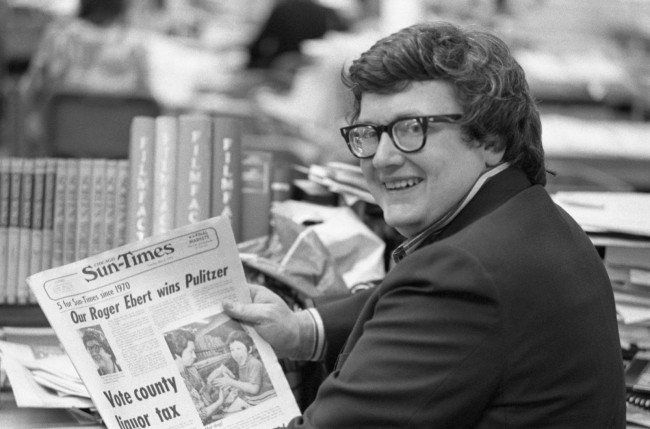Life Itself
dir. by Steve James
As it turns out, Roger Ebert wasn’t such an extraordinary man. But just an ordinary one. His story is a tired story, that of the recovered alcoholic writer, the man with the ego so big it can’t help but attract high caliber frenemies like fellow man of the thumb Gene Siskel, the wizened old war horse who won’t give in to the Big C. I don’t mean to belittle the man’s accomplishments—in that regard he still is and always will be incredible (after all, the man’s a well-deserved Pulitzer Prize recipient)—but, unfortunately, for those who don’t really give a flying fuck about film criticism, there’s not much to get excited for in director Steve James’s latest film about the rotund writer, Life Itself. The film plays off like a really well thought out, well produced eulogy. There’s very shallow digging going on here. But hey, I get it. There’s a sticky and tangled history to this film. Director Steve James wouldn’t have his current career if it weren’t for Ebert championing Hoop Dreams the way he did. Ebert’s review(s) for Hoop Dreams was nothing if not over the moon, so it’s tough to say whether or not James was willing to exploit his personal connection with this cinematic god to—like a sniveling pig—burrow. I never got the sense that James tried all that hard sniffing out the truffles of shit in Ebert’s life. Not that he necessarily should, but it might’ve rounded out the film’s contours a little better; it might’ve put more meat on those bones.
Then again: maybe there really wasn’t anything of substance to dig through in the first place. Maybe, as I’ve mentioned, Ebert’s life wasn’t really all that interesting, but more of a pastiche of charming trivia facts, like something you’d find on the flip side of a Snapple cap. There are entire stretches of the film where James is clearly lost and has no clue how to structure his mass of footage into a cohesive whole. The worst of it comes when James starts to rely heavily on the emails he shared with Ebert in those final months. Towards the end—that existential end—James started emailing Ebert his interview questions one question at a time, but the type of questions you’d ask a stranger on an elevator just to rid the air of any and all awkward silence—you know, questions to the effect of: “So, uh, what do you think of the weather, huh?”
Compelling, that is not.
The film seems almost arbitrarily cut. It jumps all over the map. One moment, the film’s addressing issues of race and understanding in a bi-racial marriage, and then, in the blink of an eye, we’re back to Siskel and Ebert’s begrudging respect for one another. It’s almost as if the film suffers from borderline personality disorder. Scene after scene, I was never quite sure what kind of movie to expect from James and company, and not in a good way. Far too scattershot.
Still, there were moments of heartbreaking truth, especially in the scenes set in Ebert’s hospital room. The most dreadful and unexpected moment is when Ebert insists that James and his crew stick around for suction time. You have to remember, in 2002 Ebert lost the lower part of his jaw to cancer, leaving the bottom of his face lone and fleshed and totally without bone, hanging loose from his remaining upper jaw, like an open bag. I must say, it was rough discovering that there’s nothing on the other side of Ebert’s mouth, nothing closing it. I’m not going to lie: it straight-up bothered me. But only briefly. I quickly got over it, mainly because it didn’t seem to bother Ebert himself. In those final months, he still smiled, he still wrote, he still loved movies. He even managed to continuously tickle the nursing staff’s funny bone. But! most importantly, he remained stubborn and saw out his life his own way. His life ended on his own terms, a luxury not many get to—or are even willing to—afford. It was a brutal journey—a realization that lands pretty damn hard once Ebert insists James get in close, real close, for that aforementioned suction time, which is when the nurse shoves a tube into Ebert’s throat and sucks out all the excess fluid from his breathing apparatus. It produces the most ghastly sound. The machine slushes and churns like a vacuum rattling with loose pebbles and change, as Ebert’s face roils into a mess of pain and agony, his color firehouse red, his lines carved deep by the many times he’s had to cringe and wince from suction sessions past. And yet, as soon as the tube slips out and the nurse sets everything away, Ebert’s back to smiling, back to jiggling his extra skin, and showing his signature thumbs up for all those to see just how persistent he could be.
If only James could have borrowed some of Ebert’s tenacity, his affinity for momentum, his sheer enthusiasm for the conflicting simplicities and complexities of life, then maybe Life Itself would have been less muddled, less confused and patch-like. What a shame. James is typically one of those directors who knows how to push his films to that next cinematic level where the magic happens, where those new angles of life are uncovered and extrapolated into a truth larger than the art house arena—a feat he pulled off with both Hoop Dreams and the 2011 masterpiece The Interrupters. Can’t say the same for Life Itself. This is a movie only for those who knew Ebert and followed his life and his criticism, and even then, it’s still a fairly rote affair with nothing new to be addressed. Who knows (for I certainly don’t): maybe there is a mainstream audience out there for Life Itself, but I doubt any of those pesky millennials are all that gung ho about taking the time and effort of columbusing it.






